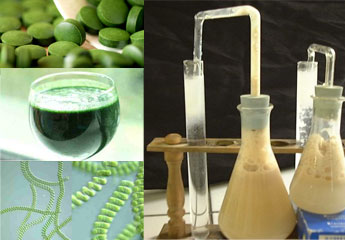
What are single cell proteins?
Single cell proteins or SCP refers to source of proteins which are extracted from single cell organisms like algae, yeast, bacteria, and fungi normally grown on agricultural waste. These are produced with an intention to use them as substitute for protein rich foods for humans and as well as for animals. Though SCP is a relatively modern concept, yet using microorganisms for food production and as animal feed supplement has been known to us since ages. Microorganisms have an ability to upgrade low protein content and this phenomenon was employed during First World War by Germans. Similarly, during Second World War other bacteria were used to replace the conventional food materials. Pruteen was the first commercial single cell protein and was mainly used as animal feed supplement.
Most developing countries suffer from malnutrition and deficiency of proteins which leads to severe complications. SCPs are a good source of proteins to these individuals as it can replace costly conventional sources like soymeal and fishmeal. Single cell protein can play a major role in alleviating protein deficiency. In case of animals they increase the nutritive values and are commonly used for fattening calves, poultry, pigs and fish breeding.
How are SCP produced?
Single-cell proteins are produced from microbial ferment waste which includes wood, straw, cannery, residue from alcohol production or food processing waste. Since these are found in very low concentration various methods to increase their concentration are employed and then they are dehydrated thoroughly to prevent spoilage. Certain product safety procedures like removal of toxic components like nucleic acids, inactivation of fungal proteases and few others are carried out. SCPs can also be genetically modified for varying amino acid composition.
Commercially available Single-cell proteins:
- Spirulina – Spirulina is popular SCPs with 60-72% protein and is also a rich source of vitamin, amino acid, minerals, crude-fiber etc. It is commonly used in supplemented diet for undernourished children. It is a part of diet for sportsmen and is used in baby foods as well. Spirulina is recommended for diabetes patients to control blood sugar level; it helps in maintaining healthy eyes and skin and is beneficial for lactating mothers. Being rich source of vitamin A and B it plays a key role in cosmetic products.
- Chlorella – Another commonly used SCP is Chlorella, single cell green algae. It contains around 45% protein, 20% fat, 20% carbohydrate and 10% minerals along with fibers and vitamins. It is promoted as a super food and is routinely used to provide health benefits. Apart from being a food supplement it is also used as an alternative medicine in several cases.
- Fusarium – Fungi has been used since ancient times either as source of food or for its medicinal value. Fusarium is one such fungus with varied application. Quorn is the commercially available protein which is marketed in several supermarkets across Europe and North America as a high-protein, low-fat, and cholesterol free product. It contains traces of vitamin B and high dietary fiber and is used to control body mass and lower risk of heart disease.
Proteins extracted from yeast, fungi and bacteria are also available in market. They differ in protein and vitamin content and their applications may depend on the nutritive values as well as presence of certain amino acids.
Side effects:
Side effects due to consumption of single cell protein can occur but are generally rare. A small group of population can suffer from minor symptoms like:
- Slight dizziness or nausea.
- Constipation or thirst.
- Stomach ache or other gastrointestinal symptom.
- Skin itching.
- Slight fever.
It is not recommended in patients with kidney or liver diseases. Also, consumption of these proteins is advisable only after consulting your healthcare practitioner.
Advantages of Single cell protein:
- SCPs are excellent source of protein containing about 43-85% of protein.
- It contains very low fat content and hence can be used widely.
- It is a rich source of vitamins, minerals and dietary fiber.
- It can be easily genetically modified to contain desirable amino acids.
- It can be used as animal feed supplement to increase weight and nutritive value.
- It is also used in technical fields like paper processing, leather processing and as foam stabilizer.
- It can be used in broad spectrum of carbon source including waste product which helps in removal of pollutants.
- Land requirement is less and the process of production is economically viable as it do not require sophisticated machinery.
- Its production is not dependent on climate or other environmental factors.
Concerns regarding Single cell protein:
- Cost of production is more than conventional food products.
- Many microorganisms produce some harmful product which has to be removed.
- Sometimes microbial biomass when taken as dietary supplement causing indigestion or allergies in humans.
- High nucleic acid content which is present in most SCPs which is not recommended in humans as it cause gastrointestinal problems, hence it is to be removed carefully.
- It requires high level of sterility control to prevent spoilage and infections.
In spite of the above concerns, SCP has a proven record of being a rich source of protein which can be produced in large quantities using compact installations. It can be used for animals and humans as a good substitute to protein rich meat and fish. With the growing population, it would be necessary to find an alternative to conventional protein food and SCP holds a strong future here. Continuous research on this topic assures that the applications of SCP would increase as we incorporate recombinant strains.
